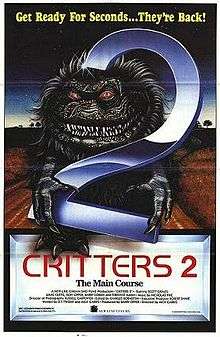Critters 2: The Main Course
| Critters 2: The Main Course | |
|---|---|
 Theatrical release poster | |
| Directed by | Mick Garris |
| Produced by | Robert Shaye |
| Written by |
|
| Starring | |
| Music by | Nicholas Pike |
| Cinematography | Russell Carpenter |
| Edited by | Charles Bornstein |
| Distributed by | New Line Cinema1 |
Release dates |
|
Running time | 94 minutes |
| Country | United States |
| Language | English |
| Budget | $4 million[1] |
| Box office | $3,813,293 (US)[2] |
Critters 2: The Main Course (also known simply as Critters 2) is a 1988 American science fiction comedy horror film starring Terrence Mann, Don Keith Opper, and Scott Grimes. It was directed by Mick Garris and written by David Twohy and Garris. It is the second film in the Critters series and is the sequel to the 1986 film Critters and was the first feature directed by Garris.
Plot
The film starts out in space on a desolate planet where human Charlie McFadden and the shapeshifting bounty hunters Ug and Lee are searching for a vicious, worm-like creature. After successfully killing the beast, they depart the planet. Soon afterwards, they receive a new assignment by Zanti, head of the High Council. He tells them that Crites (Critters or Krites) are still on Earth and must be destroyed. With that, they set a course for Earth. Noticing Charlie brooding, Ug inquires what's wrong. Charlie states his reluctance to going back after two years and asks, concerned, whether they would leave him there. Ug reassures him they had no such intentions.
Back on Earth, Brad Brown is visiting his grandmother in Grover's Bend and word gets around the town fast implying he became well known after the events of the first film. Shortly after the bounty hunters arrive the crites eat a man's (dressed as an easter bunny) stomach out. No one believes it was the crites, thinking it was a farming accident until the crites begin to terrorize the town. They begin to grow in large numbers. Lee, Ug's partner, is killed and devoured by the Critters, causing Ug to slip into a deep depression and revert to his alien form. The remaining people of the town devise a plot.
They lead the Critters to a burger shop in an attempt to blow them up but fail. The Crites then come together into a large ball and begin heading to the church (rolling over a man, killing him). Just before they reach the church, Charlie flies directly into them with Ug's spaceship, seemingly destroying the Critters and sacrificing himself. Ug then takes on Charlie's facial feature in honor of his bravery. It is later revealed the next day as Bradly begins to depart that Charlie survived by using a parachute and stays on Earth, becoming sheriff of the town. Ug departs in a new spacecraft, still wearing the guise of Charlie.
Cast
- Scott Grimes as Brad Brown
- Don Keith Opper as Charlie McFadden
- Terrence Mann as Ug
- Roxanne Kernohan as Lee
- Liane Alexandra Curtis as Megan Morgan
- Barry Corbin as Sheriff Harv
- Tom Hodges as Wesley
- Douglas Rowe as Quigley
- Lindsay Parker as Cindy
- Herta Ware as Nana
- Lin Shaye as Sal
- Sam Anderson as Mr. Morgan
- Eddie Deezen as Hungry Heifer manager
Production
Garris got the chance to direct after having worked for Steven Spielberg on the TV series Amazing Stories as a screenwriter. It was shot in Santa Clarita outside Los Angeles.[1]
Release
The film was released theatrically in the United States by New Line Cinema in April 1988. It grossed $3,813,293 at the box office.[2] it was the last film in the series to be released theatrically.
The film was released on VHS and laserdisc by New Line Home Video the same year.
In 2003, New Line Home Entertainment released the film on DVD. The film was re-released in a set containing all 4 Critters films on DVD by Warner Bros. in 2010.
Sequels
Critters 2: The Main Course was followed by Critters 3 and Critters 4, directed by Kristine Peterson and Rupert Harvey. Critters 4 used outer space scenes from this film, as well as Android.
Parodies
In an episode of The Simpsons Homer attempts to beat a world record by gathering everyone in Springfield and making them stand on each other then forming a ball which rolls down town and one man who is too slow to get away from the ball and is unfortunately ran over by the ball but is of course not eaten like in the film.
Footnotes
- ^ The film's distribution rights were transferred to Warner Bros. in 2008.
References
- 1 2 Critters 2: The Main Course at Trailers from Hell
- 1 2 "Critters 2: The Main Course". boxofficemojo.com. Retrieved 2011-03-29.
External links
- Critters 2: The Main Course at AllMovie
- Critters 2: The Main Course at the Internet Movie Database
- Critters 2: The Main Course at Rotten Tomatoes
- Critters 2: The Main Course at Box Office Mojo
| ||||||